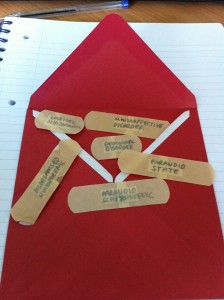This post is from Dr Linda Dubrow-Marshall, a Lecturer in Psychology at Salford. Linda is a clinical and counselling psychologist (HCPC Registered) and a BACP Accredited Counsellor/Psychotherapist. Below she reflects on teaching Level 6 (Year 3) undergraduates who are taking a module called The Psychology of Mental Health. The session was on Psychosis and Schizophrenia. If you participated in the session, Linda would really like your feedback.
 “My goal in contributing to the teaching of The Psychology of Mental Health is to help students to develop a personal framework to understand serious mental illness that is humanistic and compassionate. I had previously taught a lecture on “Mood Disorders” where I showed a DVD in which Stephen Fry interviewed several well-known people with mood disorders. The students seemed to appreciate the DVD as it extended their understanding of the facts about mood disorders to a more personal appreciation of what it is like for someone to live with a mood disorder. I took that feedback on board in planning my lecture on ”Psychosis and Schizophrenia”, and decided that even better than a DVD would be to bring in a service user and carer for part of the session, which I did.
“My goal in contributing to the teaching of The Psychology of Mental Health is to help students to develop a personal framework to understand serious mental illness that is humanistic and compassionate. I had previously taught a lecture on “Mood Disorders” where I showed a DVD in which Stephen Fry interviewed several well-known people with mood disorders. The students seemed to appreciate the DVD as it extended their understanding of the facts about mood disorders to a more personal appreciation of what it is like for someone to live with a mood disorder. I took that feedback on board in planning my lecture on ”Psychosis and Schizophrenia”, and decided that even better than a DVD would be to bring in a service user and carer for part of the session, which I did.
Also, as part of my participation in the PGCAP (Postgraduate Certificate in Academic Practice) programme, I participated in a mixed-reality game with the other PGCap students to explore teaching and learning directly linked to our practice. The goal was to come up with innovative ideas to enhance a specific teaching and learning situation. I worked with a partner, Robert Purvis, who really helped me to develop my idea of using plasters to have people experience the painful experience of having a sticky label.  Robert gave me the idea to write specific diagnoses on the plasters. Robert and I won the prize for the best collaborative ideas – the web page about the competition is available here.
Robert gave me the idea to write specific diagnoses on the plasters. Robert and I won the prize for the best collaborative ideas – the web page about the competition is available here.
On the 5th of November, I piloted this idea by trying it at the beginning of my lecture on “Psychosis and “Schizophrenia”. I noticed that the class had already been divided into learning sets, so I asked them to try an experiential learning exercise in these groups. I asked them to pick a plaster from the envelope and put it on their wrist, read the diagnosis, and reflect on what their life might be like if they had been given that diagnosis. They could consider it from the viewpoint that it was a new diagnosis that they just found out about and didn’t even understand, or something that they had for awhile. They were then to introduce themselves to their learning set as follows: “Hi, my name is ____, I am a ____, and let me tell you a little bit about my life…” I asked them to reflect on the experience, share with each other, and have a representative give a brief report to the larger group, leading to a group reflection. One of the things which I found interesting was that the learning sets had been communicating with each other via email and did not necessarily even know what the people in their learning set looked like. I enjoyed everyone’s participation and feedback. One person put the label on their clothing because it would hurt to put it on their skin – part of my point about labels hurting. People felt confused by their diagnoses and did not know what they meant. Some people felt very shy because they suddenly had this label and did not want to talk about it. The paranoid people did not feel they trusted the group in order to talk about it, demonstrating that they were really getting into the role.
I would very much appreciate feedback from students in general about the plaster exercise, and especially from those students who participated. I would also be grateful for feedback about incorporating service users and carers into the lecture. My PGCAP tutor recorded part of this exercise, and if students want to give their permission for their recordings to be put on the blog, please email l.dubrow-marshall@salford.ac.uk to give permission for this.”
You can also listen to Linda and Robert pitch their collaborative ideas for teaching and learning below.
//
